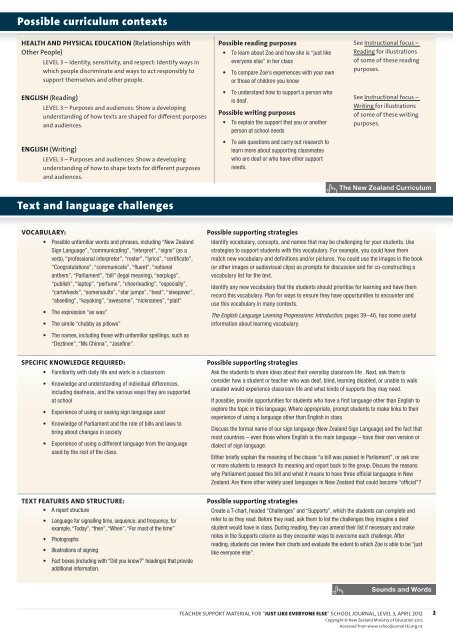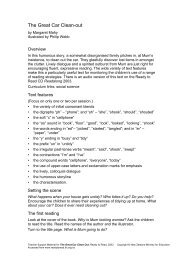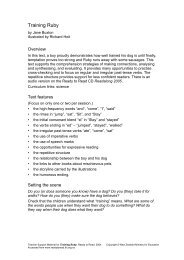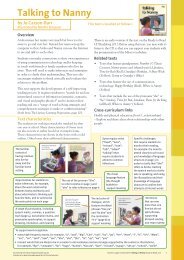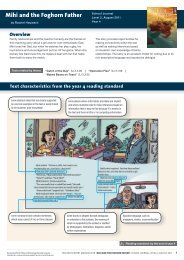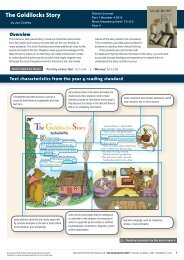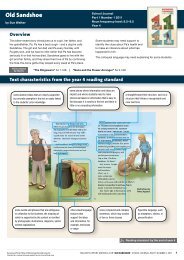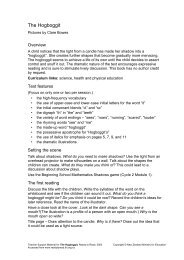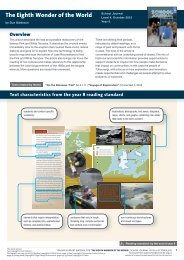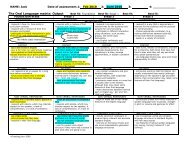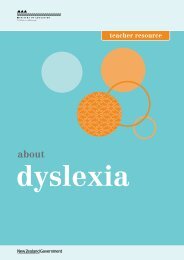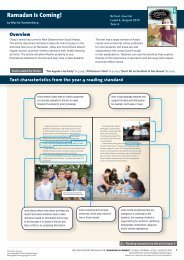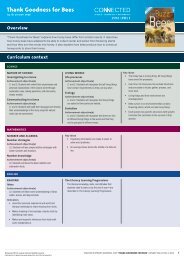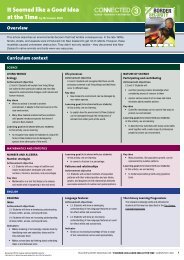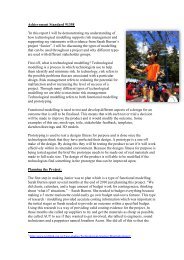L3 April 2012 - Just Like Everyone Else - Literacy Online
L3 April 2012 - Just Like Everyone Else - Literacy Online
L3 April 2012 - Just Like Everyone Else - Literacy Online
- No tags were found...
Create successful ePaper yourself
Turn your PDF publications into a flip-book with our unique Google optimized e-Paper software.
Possible curriculum contextsHealth and Physical Education (Relationships withOther People)Level 3 – Identity, sensitivity, and respect: Identify ways inwhich people discriminate and ways to act responsibly tosupport themselves and other people.English (Reading)Level 3 – Purposes and audiences: Show a developingunderstanding of how texts are shaped for different purposesand audiences.English (Writing)Level 3 – Purposes and audiences: Show a developingunderstanding of how to shape texts for different purposesand audiences.Text and language challengesPossible reading purposes• To learn about Zoe and how she is “just likeeveryone else” in her class• To compare Zoe’s experiences with your ownor those of children you know• To understand how to support a person whois deaf.Possible writing purposes• To explain the support that you or anotherperson at school needs• To ask questions and carry out research tolearn more about supporting classmateswho are deaf or who have other supportneeds.See Instructional focus –Reading for illustrationsof some of these readingpurposes.See Instructional focus –Writing for illustrationsof some of these writingpurposes.The New Zealand CurriculumVocabulary:• Possible unfamiliar words and phrases, including “New ZealandSign Language”, “communicating”, “interpret”, “signs” (as averb), “professional interpreter”, “roster”, “lyrics”, “certificate”,“Congratulations”, “communicate”, “fluent”, “nationalanthem”, “Parliament”, “bill” (legal meaning), “earplugs”,“publish”, “laptop”, “perfume”, “cheerleading”, “especially”,“cartwheels”, “somersaults”, “star jumps”, “beat”, “sleepover”,“abseiling”, “kayaking”, “awesome”, “nicknames”, “plait”• The expression “as was”• The simile “chubby as pillows”Possible supporting strategiesIdentify vocabulary, concepts, and names that may be challenging for your students. Usestrategies to support students with this vocabulary. For example, you could have themmatch new vocabulary and definitions and/or pictures. You could use the images in the book(or other images or audiovisual clips) as prompts for discussion and for co-constructing avocabulary list for the text.Identify any new vocabulary that the students should prioritise for learning and have themrecord this vocabulary. Plan for ways to ensure they have opportunities to encounter anduse this vocabulary in many contexts.The English Language Learning Progressions: Introduction, pages 39–46, has some usefulinformation about learning vocabulary.• The names, including those with unfamiliar spellings, such as“Deztinee”, “Ms Chinna”, “Josefine”.Specific knowledge required:• Familiarity with daily life and work in a classroom• Knowledge and understanding of individual differences,including deafness, and the various ways they are supportedat school• Experience of using or seeing sign language used• Knowledge of Parliament and the role of bills and laws tobring about changes in society• Experience of using a different language from the languageused by the rest of the class.Text features and structure:• A report structure• Language for signalling time, sequence, and frequency, forexample, “Today”, “then”, “When”, “For most of the time”• Photographs• Illustrations of signing• Fact boxes (including with “Did you know?” headings) that provideadditional information.Possible supporting strategiesAsk the students to share ideas about their everyday classroom life . Next, ask them toconsider how a student or teacher who was deaf, blind, learning disabled, or unable to walkunaided would experience classroom life and what kinds of supports they may need.If possible, provide opportunities for students who have a first language other than English toexplore the topic in this language. Where appropriate, prompt students to make links to theirexperience of using a language other than English in class.Discuss the formal name of our sign language (New Zealand Sign Language) and the fact thatmost countries – even those where English is the main language – have their own version ordialect of sign language.Either briefly explain the meaning of the clause “a bill was passed in Parliament”, or ask oneor more students to research its meaning and report back to the group. Discuss the reasonswhy Parliament passed this bill and what it means to have three official languages in NewZealand. Are there other widely used languages in New Zealand that could become “official”?Possible supporting strategiesCreate a T-chart, headed “Challenges” and “Supports”, which the students can complete andrefer to as they read. Before they read, ask them to list the challenges they imagine a deafstudent would have in class. During reading, they can amend their list if necessary and makenotes in the Supports column as they encounter ways to overcome each challenge. Afterreading, students can review their charts and evaluate the extent to which Zoe is able to be “justlike everyone else”.Sounds and WordsTeacher support material for “<strong>Just</strong> like <strong>Everyone</strong> <strong>Else</strong>” School Journal, Level 3, <strong>April</strong> <strong>2012</strong>Copyright © New Zealand Ministry of Education <strong>2012</strong>Accessed from www.schooljournal.tki.org.nz2


